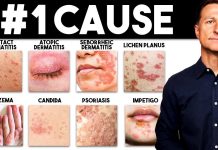Understanding the Hidden Sugar Trap
There are seven very surprising signs that indicate you’re consuming too much sugar. While most people are familiar with the classic symptoms like fatigue, brain fog, belly fat, cravings for carbs, and cavities, it’s crucial to delve deeper into what sugar truly is. The confusion surrounding sugars and carbohydrates—complex or simple—often leads to blurred understanding. A carbohydrate essentially contains three elements: sugar, fiber, and starch. However, the invisible sugar that escapes widespread notice is starch.
Starch, found not just in vegetables but in surprising places on grocery store shelves, is indeed sugar interconnected. Known as “polysaccharides”—’poly’ meaning many and ‘saccharides’ meaning sugar—starch is sugar. When encountering starch in products like powdered forms, you’re actually consuming sugar. Alarmingly, this starch spikes blood sugar levels far more than table sugar. Table sugar sits at a 65 on the glycemic index, while maltodextrin—a common starch—reaches 185, causing a drastic blood sugar spike.
The Unseen Dance of Profit and Health
In the world of grocery goods, starches like maltodextrin, modified food starch, and corn derivatives are prevalent, thanks largely to their low production costs and high profitability. Remarkably, $198 worth of corn can transform into 3,636 boxes of cornflakes, yielding a stark 7,115% profit margin. Yet, paradoxically, products like cornflakes and vegetable oils are lauded as heart-health friendly, while meat—a healthier alternative—is frequently vilified. Profit drives the perpetuation of ultra-processed foods, impacting our health subtly but significantly.
Seven Signs You’re Consuming Too Much Sugar
1. High Levels of Adrenaline
At the zenith of surprising indicators is elevated adrenaline levels. Excessive sugar intake impairs energy production within the mitochondria, necessitating an adrenaline surge as compensation. This results not only in energy but also in mobilizing and creating glucose, known as gluconeogenesis. Rather than mental stress, this adrenaline surge stems from physical stress at the cellular level, manifesting as nervous energy and restlessness—a hallmark of mitochondrial damage.
2. Susceptibility to Infections
Excess sugar debilitates the immune system, heightening vulnerability to infections. The body’s defense mechanisms are compromised as they labor to process continuous sugar influx, leaving you prone to illnesses.
3. Low Testosterone
Sugar consumption dampens testosterone levels, leading to challenges such as erectile dysfunction, decreased libido, and muscle-building difficulties, due to testosterone’s vital role in these processes.
4. Red or Pink Gums
When brushing your teeth reveals pink in your brush, it signals a mild scurvy form due to vitamin C deficiency. Sugar consumption obstructs vitamin C absorption, with gums reflecting the first signs.
5. Chronic Sinus Problems
Persistent sinus issues commonly stem from a sugar-fed fungus, Aspergillus. These infections thrive on sugar, making eliminating sugar essential for eradicating chronic sinus problems.
6. Chronic White Tongue
A persistent white coating on the tongue often indicates Candida overgrowth, fueled by sugar. Reducing sugar intake is crucial in battling this persistent fungal presence.
7. Reduced Collagen Production
Excess sugar diminishes collagen production, manifesting in loose, wrinkled skin and premature aging. Sugar accelerates the aging process, eroding youthful vitality.
The dance between what we consume and how it affects us is delicate and profound. As we navigate the modern food landscape, it becomes increasingly essential to be aware, informed, and intentional with our choices. Consider watching the video on maltodextrin for further insights into how processed foods weave into this intricate tapestry of health.








































